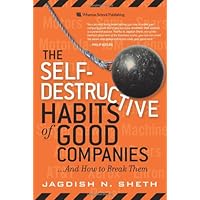
Average Reviews:

(More customer reviews)Maintaining the success of a corporation over the long term has a lot to do with the fortunes afforded by healthy market forces, but there can be debilitating factors afoot that do not allow companies to take advantage nor insulate themselves during inevitable downturns. These factors may be obvious from a conceptual standpoint, but as Steven Covey has proven with his bestseller, The 7 Habits of Highly Effective People, sometimes the most obvious things have to be laid out in an easy-to-absorb manner that resonates with people who are most prone to such behavior. Whereas Covey identifies positive habits on an individual level, Emory University's Jagdish N. Sheth takes the more daunting task of identifying the self-destructive habits of corporate leaders as proven by renowned companies experiencing very public failures. Not coincidentally, Sheth limits himself to seven to make the comparison with Covey all the more clear. Like Covey, the author trumpets them like the Seven Deadly Sins, and four of the seven especially take on that aura.
The most obvious is hubris. Unexpected success, especially at the magnitude that brings widespread media attention, can inflate the egos of an unprepared leadership exponentially. Key examples we have seen recently have been Ken Lay and Jeffrey Skilling at Enron; Bernard Ebbers at WorldCom; and in the related political arena, the Republican Party circa November 2006 when the leadership forced their own value system upon constituents unwilling to accept such rhetoric and legislation unconditionally. On the other end of the outward behavioral model is complacency where success is taken for granted, so much so that monopolists lose their grip on the market forces far earlier than potential competitors think about entering it with their own niche strategy. Especially guilty are monopolies of distribution and regulation, the latter in cases where the government owns the business as in the case of Air India. The territorial impulse is the third factor, the tendency to develop functional silos around a company's perceived value, which ultimately comes down to a level of unnecessary in-fighting that results in suboptimal performance. What happens here is that insulation from an uncontrollable market becomes a greater priority than looking at encouraging new avenues for value.
This last fact is critical in understanding how the fourth self-destructive habit, volume obsession, festers. Volume is seen as an overriding factor for success, even though the profit margins are eroding with the increasing desire to commoditize. Little if any attention is paid to whether one's output is becoming obsolete in an ever-changing market. According to Sheth, the less obvious factors could be the most damaging because they are insinuative by their very nature. Denial is one such habit where current realities are not even confronted, and he points to the aversion to the Green Movement as a key example of an inevitable need being ignored since short-term benefits cannot be clearly ascertained. Even more common among companies depending on specialty technologies for their profits is an inability to face any advances that would cause disruption to their business models, and this could run the gamut from online social networking to outsourcing.
The remaining two bad habits are competency dependency and competitive myopia, which really strike me as outgrowths of the other five. Sheth defines competency dependence as the inability to re-invent oneself, whereas competitive myopia is when a company starts to align the competition with its perception of their limitations and thus underestimate what they can do. The author's perspective is hardly dire as he concisely outlines what strategies corporate leadership needs to enact to break the cycle of perpetual destruction. As he showed with his recent co-authorship of Firms of Endearment: How World-Class Companies Profit from Passion and Purpose, Sheth is an engaging writer who easily brings a real-world context to his theories. Although not really groundbreaking, the book is a fast read and an insightful one for those executives and managers looking for guidelines around their company's growth.
Click Here to see more reviews about: The Self-Destructive Habits of Good Companies: ...And How to Break Them
Why Even Great Companies Fail: Diagnose the Symptoms and Cure Them!Conquer—or prevent—the seven disastrous "addictions" that can destroy your company Overcome corporate denial, arrogance, complacency, "competency dependence," turf wars, and more

0 comments:
Post a Comment